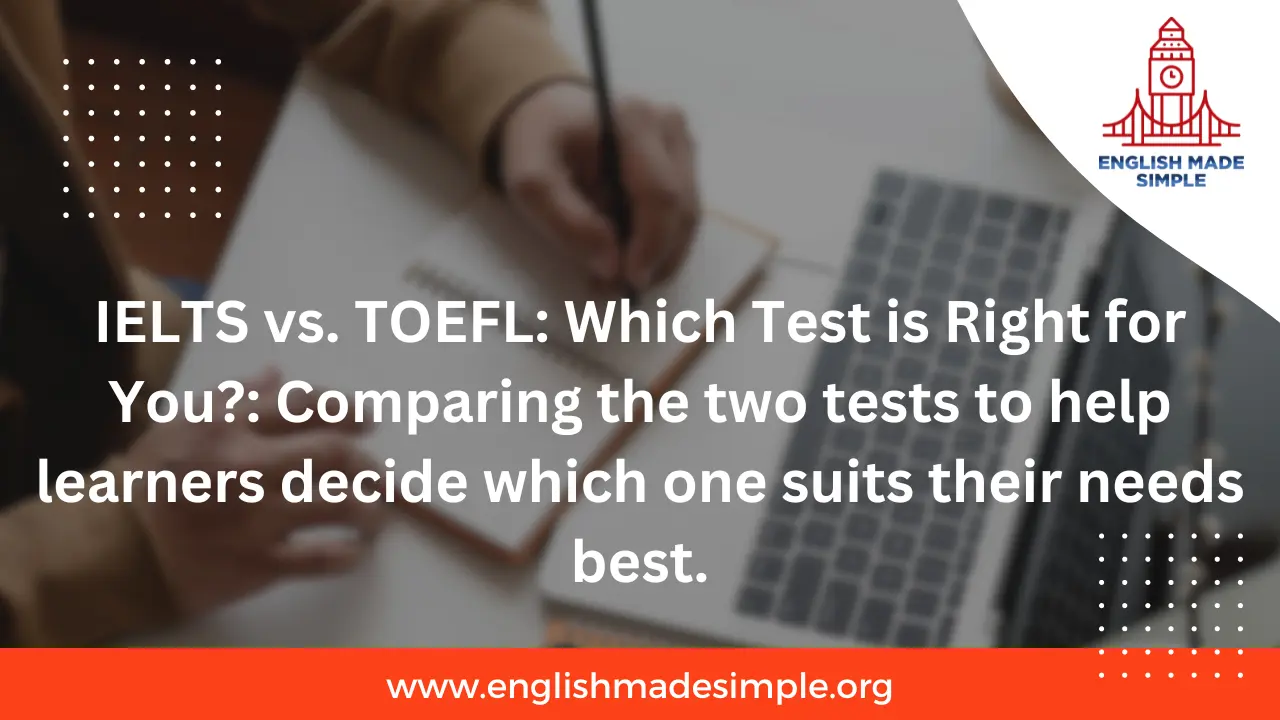
IELTS vs. TOEFL: Which Test is Right for You?
Choosing the right English proficiency test can be a crucial decision for anyone aiming to study, work, or migrate to an English-speaking country. The two most widely recognized tests are the IELTS (International English Language Testing System) and the TOEFL (Test of English as a Foreign Language). This blog will compare these tests to help you decide which one suits your needs best.
Overview of IELTS and TOEFL
IELTS:
- Administered by: British Council, IDP: IELTS Australia, and Cambridge Assessment English.
- Test Formats: Academic and General Training.
- Purpose: Higher education, professional registration, and immigration.
- Test Delivery: Paper-based and computer-delivered options.
TOEFL:
- Administered by: Educational Testing Service (ETS).
- Test Formats: TOEFL iBT (Internet-based Test) and TOEFL PBT (Paper-based Test, less common).
- Purpose: Primarily for academic purposes.
- Test Delivery: Internet-based and limited paper-based options.
Test Structure and Content
IELTS Structure:
- Listening (30 minutes + 10 minutes transfer time): Four sections with ten questions each.
- Reading (60 minutes): Three sections with 40 questions.
- Writing (60 minutes): Two tasks.
- Speaking (11-14 minutes): Face-to-face interview with an examiner.
TOEFL Structure:
- Reading (54-72 minutes): 3-4 passages with 10 questions each.
- Listening (41-57 minutes): 4-6 lectures and 2-3 conversations.
- Speaking (17 minutes): Four tasks recorded and sent to ETS for scoring.
- Writing (50 minutes): Two tasks.
Detailed Comparison
Listening Section:
- IELTS: Includes various accents (British, Australian, New Zealand, American).
- TOEFL: Primarily North American accents.
Reading Section:
- IELTS: Includes a variety of question types (multiple choice, true/false/not given, matching information, etc.). Passages are from books, journals, magazines, and newspapers.
- TOEFL: Mostly multiple-choice questions. Passages are from academic texts.
Writing Section:
- IELTS:
- Academic: Task 1 requires describing visual information (graphs, charts, etc.); Task 2 involves writing an essay.
- General Training: Task 1 involves writing a letter; Task 2 involves writing an essay.
- TOEFL:
- Task 1: Integrated writing task (read a passage, listen to a recording, and write a response).
- Task 2: Independent writing task (write an essay based on personal experience or opinion).
Speaking Section:
- IELTS: Face-to-face interview with an examiner. It includes short questions, speaking at length about a familiar topic, and a structured discussion.
- TOEFL: Recorded responses to questions. It includes independent and integrated speaking tasks.
Scoring and Results
IELTS:
- Scored on a band scale of 1-9 for each section. The overall score is an average of the four sections.
- Results available in 13 days for paper-based and 3-5 days for computer-delivered tests.
TOEFL:
- Scored out of 120 (30 points per section).
- Results available in approximately 6 days.
Acceptance and Recognition
IELTS:
- Widely accepted in the UK, Australia, New Zealand, and Canada.
- Also accepted by many institutions in the USA.
TOEFL:
- Widely accepted in the USA.
- Also accepted by many institutions in the UK, Australia, New Zealand, and Canada.
Choosing the Right Test
Consider IELTS if:
- You prefer a face-to-face speaking test.
- You are applying to institutions in the UK, Australia, New Zealand, or Canada.
- You feel comfortable with a variety of question types.
- You prefer paper-based tests.
Consider TOEFL if:
- You are comfortable with computer-based tests.
- You are applying to institutions in the USA.
- You prefer multiple-choice questions.
- You are comfortable with North American accents.
Tips for Decision Making
- Check Requirements: Confirm the test requirements of the institutions or organizations you are applying to.
- Evaluate Skills: Consider your strengths and preferences in test formats and question types.
- Practice Tests: Take practice tests for both IELTS and TOEFL to see which one you are more comfortable with.
- Consider Locations and Dates: Check the availability of test centers and dates for both tests in your area.
Conclusion
Both IELTS and TOEFL are prestigious and widely recognized English proficiency tests. Your choice should be guided by the specific requirements of your desired institutions, your personal strengths and preferences, and the test formats. By understanding the differences between the tests and considering your own needs, you can make an informed decision that will best support your academic or professional goals.
